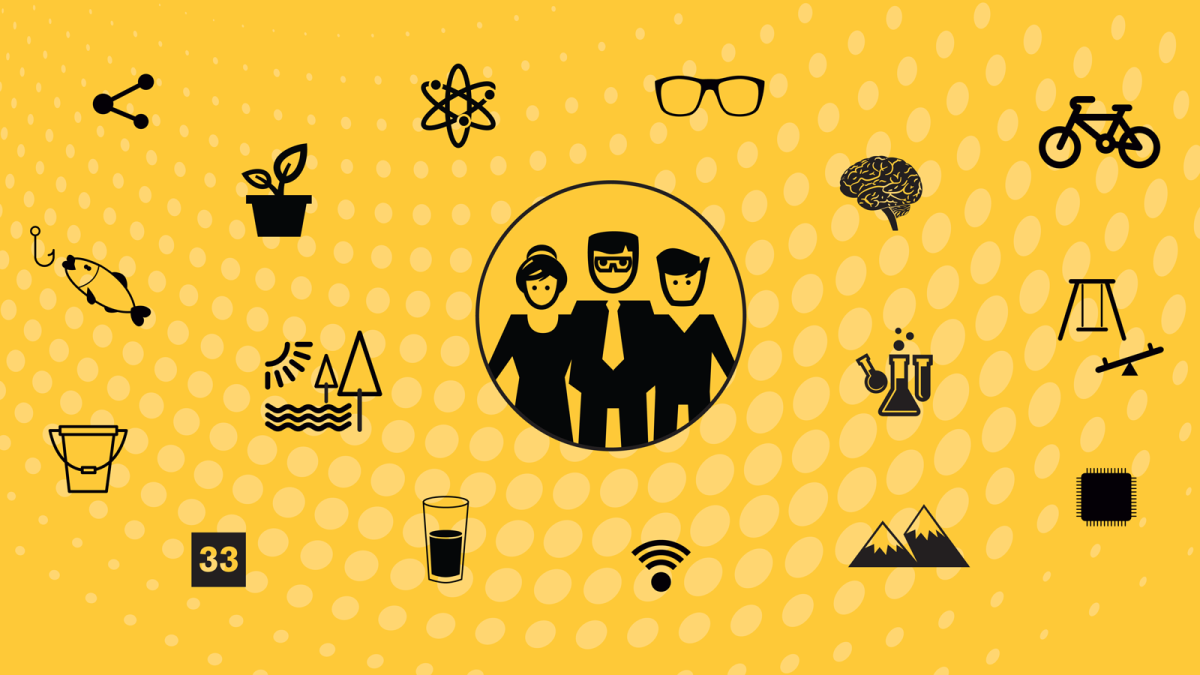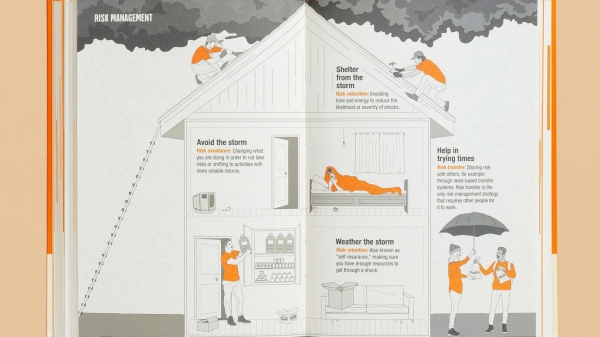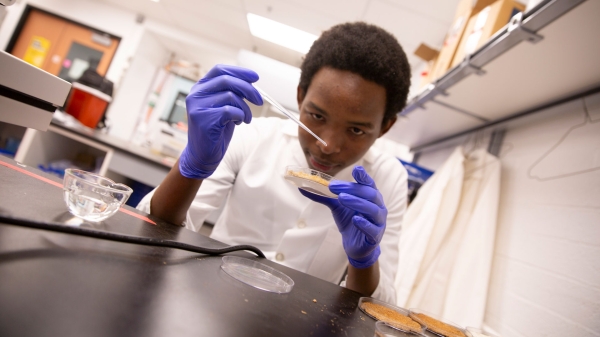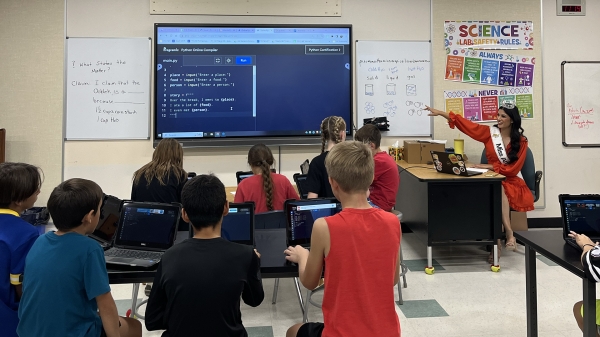EPICS engineers help local and global communities

The Engineering Projects in Community Service (EPICS) Elite Pitch Competition in spring 2020 featured winning teams of undergraduate students in the Ira A. Fulton Schools of Engineering at Arizona State University who are solving community challenges related to the environment, aging, public health and clean water access. Graphic by Rhonda Hitchcock-Mast/ASU
When communities and engineers work together, everyone benefits. That’s the purpose behind the Engineering Projects in Community Service program, better known as EPICS, in the Ira A. Fulton Schools of Engineering at Arizona State University.
The program has grown rapidly in the past year — from around 180 students in spring 2019 to approximately 325 students participating a year later — to help communities both near and far, concentrated and widespread.
Projects from the top teams in the 2019-20 cohort include solutions to challenges related to the environment, aging, public health and clean water access.
Students apply engineering skills to give back to society
Throughout the yearlong program, student teams work directly with community partners who pose a problem that could be solved through engineering.
“Students get the opportunity to make something that will actually be used to solve a problem people face in some aspect of their lives,” said Jared Schoepf, a lecturer and the director of operations for the EPICS program.
Across two semesters, students develop a small-scale prototype and build upon it until they ultimately deliver a solution to their community partner. During both semesters, EPICS teams undergo design reviews, during which a panel of judges gives technical feedback.
In previous years, the design review scores qualified the top EPICS teams to participate in the EPICS Elite Pitch Competition for additional funding to build their prototype and demonstrate to other students what it takes to make a successful community solution through engineering.
Now, a new partnership has enabled teams to apply to the EPICS Elite Pitch Competition for additional opportunities and expand the reach of their projects.
New partnership brings wider societal impact
The EPICS program formed a new partnership this year with Entrepreneurship + Innovation @ Fulton, an initiative that helps ASU students, faculty and staff develop their ideas and startup ventures through a variety of programs and funding opportunities.
Entrepreneurship + Innovation @ Fulton has added a new funding dimension for community-focused engineering projects by offering a funding track designed especially for ventures addressing social needs.
“Now there’s an opportunity for students to use the EPICS Elite Pitch Competition to prepare them to compete for that social venture funding track,” Schoepf said.
As part of this change, any EPICS team can now apply to win up to $1,500 in the EPICS Elite Pitch Competition, which would then prepare them to apply for Venture Devils, an ASU-wide entrepreneurship program that helps support ASU-affiliated startup founders with mentorship and funding. Venture Devils Demo Day, held twice per year, provides EPICS teams a chance to compete for a broad array of grant funding, ranging between $1,000 and $100,000 in nondilutive capital.
“EPICS has always been a little entrepreneurial because teams work directly with their partner or customer to create a solution or product that addresses their needs and will actually be put to use,” Schoepf said. “EPICS encourages students to think about solving a problem for one person or community, but they’re unlikely to be the only one who faces the problem and could use the student's solution. This opportunity allows them to start thinking about who else is facing this problem and how can they scale their idea into a sustainable venture to help everyone.”
Top teams help a wide range of issues
Urban bodies of water like Selleh Lake in Tempe, Arizona, are facing microbiological disasters that can impact aquatic life, surrounding communities’ public health, regional agriculture and other aspects of local life.
Chemical engineering major Abigail Pezelj and her team, Selleh Lake Restoration, LLC, are creating a filtration system that targets cyanobacteria, green algae and coliform bacteria, all of which are common freshwater invaders known to cause problems for both aquatic ecosystems and human life. By selectively filtering out these invasive species, freshwater ecosystems will be able to sustain aquatic life and surrounding communities will be revitalized. The team took home first place and $1,500.
“We took an existing concept, rapid-sand filtration, and optimized it for our needs,” Pezelj said. “Not only have we scaled down the process, but we have also engineered a unique and effective blend of packed bedding and fit it into a compact and sleek design.”
Alzheimer’s disease currently affects more than 5 million people in the United States. A way to help people affected by the disease came from mechanical engineering major Andrew Deros’ experience in a Devils Invent weekend hackathon event where students were tasked with developing technology to help the world’s elderly population become more independent.
“My co-founders and I decided on a design that would assist people with Alzheimer’s disease and dementia with remembering their loved ones through the use of smart glass technology,” Deros said.
Memory Glass is an attachment to glasses that uses facial recognition technology to help a user identify people’s names and relationships in real time and avoid the need to ask mid-conversation. Deros and his team earned second place and $1,000.
Public health is a widespread issue, and incorporating a fun activity to promote exercise and ecotourism in the Shonto community of the Navajo Nation in Northern Arizona has been part of a multiyear EPICS project.
Civil engineering major Alexander Owen and his team, Navajo Mountain Bike Initiative, are building a pump track — a looped trail with hills that bikers can use to gain momentum.
“When our team visited the Navajo Nation, we discovered that the geography made the area a great candidate for mountain biking, a popular sport that is eco-friendly,” Owen said. “Jonathan Nez, the current president of the Navajo Nation; Felix Fuller, the Shonto Chapter president; and fitness and health advocates within the nation supported this idea, and we began our work in Shonto a few years ago.”
The team has already built a track at a Shonto elementary school as well as mountain biking trails designed to draw in tourists. They’re also expanding to Tuba City and Kayenta, purchasing bikes and other mountain biking essentials to donate to elementary school children. This year, the team won third place and earned $500.
Biomedical engineering major Lucianne Morin and mechanical engineering major Benjamin Voller-Brown led a pair of teams to help address an issue that a community is facing nearly 4,000 miles away in Peru.
The team traveled to the country in 2018 to work with the nonprofit 33 Buckets (which started as an EPICS project in 2010) on an installation trip. 33 Buckets helps enable access to clean water by developing “self-sustaining community water franchises” in the communities it serves. One of the founders of 33 Buckets, Mark Huerta, is now a lecturer at ASU teaching EPICS courses.
“Some students noticed that 33 Buckets had no current solutions for treating E. coli in infected water,” Morin sayid. “Not only that, but JASS, the water board in Occupata, Peru, had actually stopped water treatment because it was so inaccurate and time-consuming. We wanted to make a device that would be far more accurate, and also need a human operator only once every few weeks rather than taking hours every day.”
Morin’s team developed a chlorine sensor for a water purification system that helps remove contaminants like E. coli from drinking water sources. Voller-Brown and his team worked on an autonomous residual chlorine sensor to detect chlorine levels for drinking water in rural Peru. The two teams tied for fourth place and earned $300 to continue their work.
Continuing funding through Venture Devils
All teams that placed in the EPICS Elite Pitch Competition are planning to compete for more funding through Venture Devils and the social venture track provided by the Entrepreneurship + Innovation @ Fulton partnership.
Pezelj and her team are taking the next steps to compete in Demo Day to pitch for further funding for the Selleh Lake Restoration project’s technology development.
Deros and Memory Glass have been part of Venture Devils since January 2020, and it’s been a great help in developing their product.
“Venture Devils has provided many great opportunities for funding, patenting, networking and other business strategies needed to take this product to market in the future,” Deros said.
Owen sees a lot of opportunity for the Navajo Mountain Bike Initiative to take off in the next few years and Venture Devils provides the opportunity to expand the scope of the project.
“We wanted to grow our idea and project, so we applied to Venture Devils knowing that we would receive mentorship and the funds necessary to continue expanding our project,” Owen said.
The 33 Buckets chlorine sensor and injector project teams are combining efforts to pursue funding through Venture Devils.
“Our Venture Mentor has been a huge help in making sure we pitch our product in the most concise and effective way possible,” Morin said.
Read more about the top teams and how they are expanding their projects' reach on Full Circle.
More Science and technology

ASU author puts the fun in preparing for the apocalypse
The idea of an apocalypse was once only the stuff of science fiction — like in “Dawn of the Dead” or “I Am Legend.” However…

Meet student researchers solving real-world challenges
Developing sustainable solar energy solutions, deploying fungi to support soils affected by wildfire, making space education more…

Miss Arizona, computer science major wants to inspire children to combine code and creativity
Editor’s note: This story is part of a series of profiles of notable spring 2024 graduates. “It’s bittersweet.” That’s how…